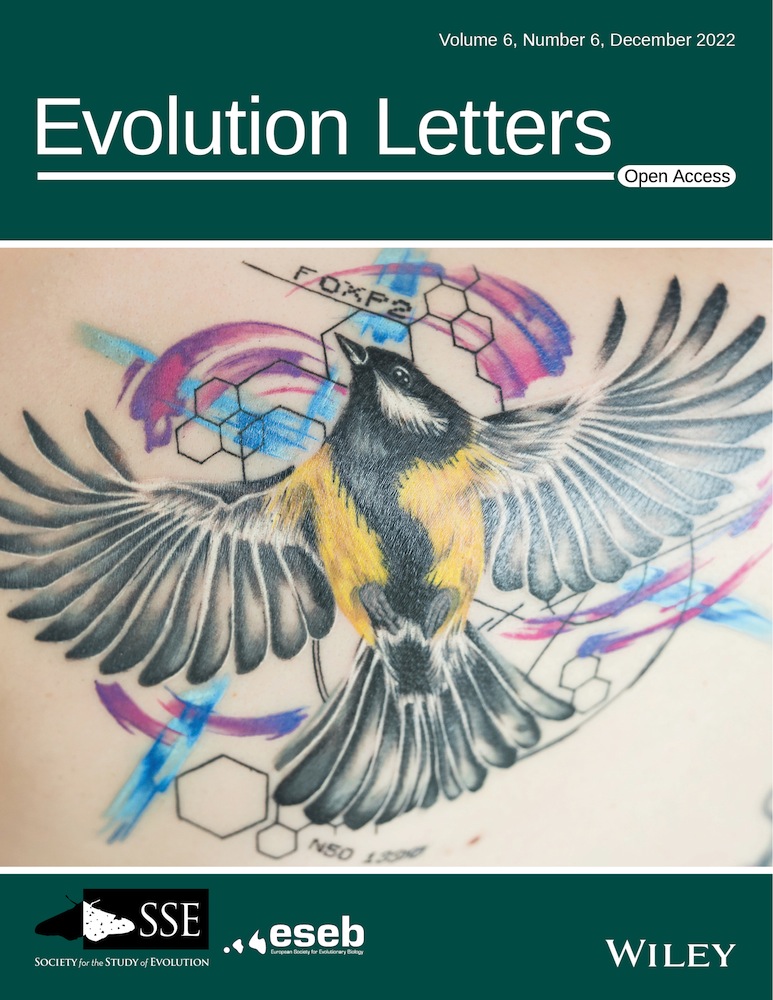Unraveling mate choice evolution through indirect genetic effects
IF 3.4
1区 生物学
Q2 EVOLUTIONARY BIOLOGY
引用次数: 0
Abstract
Attractiveness is not solely determined by a single sexual trait but rather by a combination of traits. Because the response of the chooser is based on the combination of sexual traits in the courter, variation in the chooser’s responses that are attributable to the opposite-sex courter genotypes (i.e., the indirect genetic effects [IGEs] on chooser response) can reflect genetic variation in overall attractiveness. This genetic variation can be associated with the genetic basis of other traits in both the chooser and the courter. Investigating this complex genetic architecture, including IGEs, can enhance our understanding of the evolution of mate choice. In the present study on the field cricket Gryllus bimaculatus, we estimated (1) genetic variation in overall attractiveness and (2) genetic correlations between overall attractiveness and other pre- and postcopulatory traits (e.g., male latency to sing, female latency to mount, male guarding intensity, male and female body mass, male mandible size, and testis size) within and between sexes. We revealed a genetic basis for attractiveness in both males and females. Furthermore, a genetic variance associated with female attractiveness was correlated with a genetic variance underlying larger male testes. Our findings imply that males that mate with attractive females can produce offspring that are successful in terms of precopulatory sexual selection (daughters who are attractive) and postcopulatory sexual selection (sons with an advantage in sperm competition), potentially leading to runaway sexual selection. Our study exemplifies how the incorporation of the IGE framework provides novel insights into the evolution of mate choice.通过间接遗传效应揭示择偶进化的奥秘
吸引力并不完全由单一的性特征决定,而是由多个性特征组合而成。由于选择者的反应是基于求爱者的性特征组合,因此,异性求爱者基因型对选择者反应的影响(即对选择者反应的间接遗传效应 [IGEs])可以反映整体吸引力的遗传变异。这种遗传变异可能与选择者和求爱者其他特征的遗传基础有关。研究包括 IGEs 在内的这种复杂的遗传结构可以加深我们对择偶进化的理解。在对田野蟋蟀Gryllus bimaculatus的本研究中,我们估算了(1)总体吸引力的遗传变异;(2)总体吸引力与其他繁殖前和繁殖后性状(如雄性的歌唱潜伏期、雌性的上马潜伏期、雄性的护卫强度、雄性和雌性的体质量、雄性下颌骨大小和睾丸大小)在性别内和性别间的遗传相关性。我们揭示了雄性和雌性吸引力的遗传基础。此外,雌性吸引力的遗传变异与雄性睾丸较大的遗传变异相关。我们的研究结果表明,与有吸引力的雌性交配的雄性所生的后代可以成功地进行配种前的性选择(女儿有吸引力)和配种后的性选择(儿子在精子竞争中具有优势),从而可能导致性选择失控。我们的研究举例说明了 IGE 框架如何为配偶选择的进化提供新的见解。
本文章由计算机程序翻译,如有差异,请以英文原文为准。
求助全文
约1分钟内获得全文
求助全文
来源期刊

Evolution Letters
EVOLUTIONARY BIOLOGY-
CiteScore
13.00
自引率
2.00%
发文量
35
审稿时长
10 weeks
期刊介绍:
Evolution Letters publishes cutting-edge new research in all areas of Evolutionary Biology.
Available exclusively online, and entirely open access, Evolution Letters consists of Letters - original pieces of research which form the bulk of papers - and Comments and Opinion - a forum for highlighting timely new research ideas for the evolutionary community.
 求助内容:
求助内容: 应助结果提醒方式:
应助结果提醒方式:


